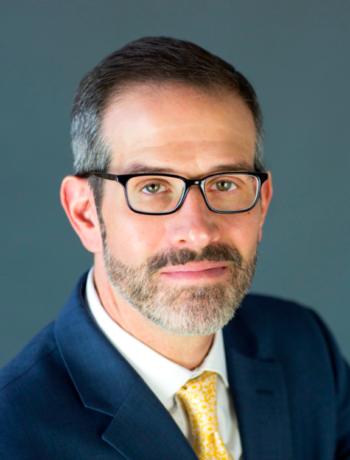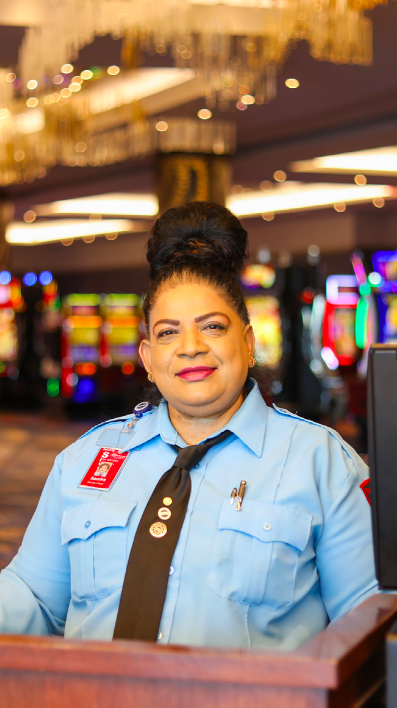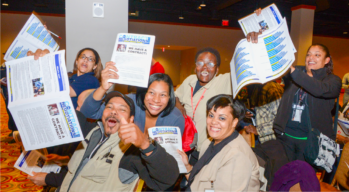A Report from HTC President Rich Maroko
This fall marks the ten year anniversary of our first gaming contract at Resorts World New York City. This contract was, and remains, one of our Union’s most remarkable victories.

Workers making just $10 an hour saw their wages double overnight, gained access to free healthcare, a pension plan, and the protection of fighting union. Since then, we’ve gone on to organize and win contracts at every new casino in New York State.
In the next two years, New York State is expected to approve three new downstate casino licenses, creating thousands of new gaming jobs for New Yorkers. It’s our job to make sure these jobs are good ones.
Looking back
Our Union started fighting for the workers at Resorts World NYC years before the casino even opened. In the early 2000s, our leadership correctly predicted that gaming was coming to New York on a large scale. We saw how non-union operations had grown into powerful forces in the hospitality and gaming industry in other states. We knew that big casinos tend to turn into big casino-hotels, and that a large, low-wage gaming industry in New York would erode our hotel contract standards.
In 2002, we fought to ensure that the State required “labor peace” as part of any new casino development — meaning, in order to make a bid for a state license to open a new casino, every gaming company had to sign an agreement that they would work peacefully with a union.
So, before it even opened its doors in 2011, Resorts World NYC had signed a legally bind- ing agreement to allow union organizers to talk to workers on-site, to remain neutral during the organizing process (i.e. no anti-union campaign), and to recognize the union as the workers’ official representative after a simple majority signed union cards (rather than going through a government-run election).
This meant, when Resorts World opened, our organizers were able to enter the facility and speak to workers in the cafeteria. Most of these workers put in 40 hours a week, but lived in poverty. They were making $10 an hour, and the casino offered no real benefits. Several workers were living in homeless shelters. One worker couldn't afford his metro card and had to walk two hours to work. Another lived a 15 minute drive from the casino, but could not afford a car. She spent hours a day commuting to work on four buses.
Word about our Union’s wages and benefits spread quickly through the facility. Organizers gathered cards from an overwhelming majority of the workers in just a few weeks. Then came the hard part — getting Resorts World to agree to a contract.
A real living wage
After rounds of negotiating with Resorts World, we won nearly every important contract provision including protections against unfair discipline, scheduling rights, and our grievance and arbitration language. But we couldn’t agree on wages. We told Resorts World that the raises they were offering weren’t nearly enough and we wouldn’t accept them.
Fortunately, we had another tool at the bargaining table. Our labor peace agreement with Resorts World included a provision for interest arbitration — which allowed our Union to resolve a contract fight through arbitration rather than a strike. We invoked this right to fight for the wages that we thought the workers deserved. Our argument had three key components:
First, we enlisted expert economists, professors, and industry experts to conduct studies that proved management’s economic proposals were far below an actual living wage in New York City.
Second, we argued that Resorts World was offering wages that were wildly lower than those being paid to HTC members in New York City hotels — not to mention the other benefits that accompany those wages in our union shops.
Third, we helped prepare workers to share their stories with the arbitrator. One worker testified that she spent hours each day commuting to Queens from a homeless shelter in the Bronx. Another shared that they could not afford health insurance, despite working full time.
The arbitrator issued his award on October 18, 2013. He sided with our Union, completed the contract, and transformed minimum wage, zero-benefit jobs into the best gaming jobs in the country. Wages doubled overnight — and tripled by the end of the initial five-year contract.
Life transformed
One of our expert witnesses, Dr. Stephanie Luce, a professor at the City University of New York, conducted a survey of the workforce at Resorts World. Prior to the union contract, she found that a huge majority of the workers relied on public assistance, subsidized housing, and food vouchers; had accumulated crippling credit card debt; were unable to save for their children’s education; and had to work second — and even third — jobs just to get by.
Just six months after the contract, Dr. Luce surveyed the workforce again. The survey revealed that in that brief time, the workers had already experienced a 50% drop in unpaid medical bills, a 46% drop in late rent or mortgage payments, a 67% drop in needing to borrow money to cover bills, a 75% drop in using government assistance for food and medical needs, a 68% drop in holding a second job, and an 80% drop in irregular schedules and on call work.
Now, a full decade later — workers have been able to purchase homes and cars, put themselves and their children through college, travel, and much more. Our Union created nearly 1,000 excellent, middle class jobs at Resorts World; jobs
that allow workers to live the full, dignified
lives they deserve. These jobs set a new, fair
standard in New York State’s growing gaming
industry.
In the years since, we’ve gone on to organize and win contracts for every new casino and gaming facility in the State, including Rivers in Schenectady, del Lago in Waterloo, Resorts World Catskills in Monticello, and Resorts World Hudson Valley in Newburgh. We’ve also dramatically improved wages and working conditions for our members at Saratoga Casino and Race Course in Saratoga Springs, Aqueduct and Belmont Racetracks in Queens, and Empire City Casino in Yonkers. Today, we represent over 5,000 gaming workers. Every single one of our gaming contracts include significantly higher wages, affordable benefits, and the world-class protections and rights on the job that we’ve spent nearly 100 years establishing for hospitality workers.

Marlene Ferreira, Server
I was in college for architecture when I started at Resorts World. I was helping out at home, and the money wasn't enough. Then we got the Union. Having the contract helped me focus in school, afford my rent. I graduated that same year, and the next year I was able to buy a house in Long Island. Then, a few years ago I had my daughter. It was during the pandemic, so I was really grateful to have the Union then, to still have health insurance.

Sandra Charles, Security Officer
I have three daughters, I’m a single parent. Prior to the Union, I was working 3 jobs and living paycheck to paycheck — not even really, because it was never enough. I didn’t know where our next meal would come from. One of my daughters was still back home in Guyana. Then we got the contract in 2013. There was peace in my life afterwards. I was finally making enough money to sponsor my daughter and bring her to New York. Today, all my girls have good jobs, they finished college. I made sure they graduated debt-free. Everyone asks me, how did I do all of this by myself? I say, I thank God for my strength, and I thank God for my Union.

Christopher Santana, Bartender
When the Union came in, it took the pressure off my shoulders. It was easier to eat, to take the train, to save money. And the healthcare helped a lot — I’m diabetic, and the union insurance covers basically all of my care. With that taken care of, and the wages, I’ve been able to travel the world. I’ve been to ten countries so far.

Gaming is expanding downstate
Without our intervention over the past two decades, gaming could have easily become a growing, exploitative, non-union industry in New York State. Look no further than Florida, a state with a non-union gaming industry, where dealers earn an average of only $12.35 an hour.
Having thousands of horrible, non-union hospitality jobs at casinos just a few miles down the road from our Union’s hotels and casinos could have compromised our power over employers in the greater region. But that’s not the case. Today, casino jobs in New York are good jobs because they are union jobs. As the gaming industry continues to grow, so does our Union.
In recent years, we’ve used our legislative power to accelerate New York State’s timeline for awarding three new downstate casino licenses. These licenses are expected to be awarded in the next one to two years.
The Union’s leadership has worked relentlessly to ensure that every single company in the running for a casino license signs a labor peace agreement with our Union — just like we did at Resorts World NYC. Today, virtually all of the real contenders have an agreement with us.
We’re also creating a new dealer training program, so our members have an opportunity to learn the skills they will need to land jobs dealing table games or poker at the new casinos.
We have the power and responsibility to ensure these new casino jobs are union — for the thousands of workers who will staff them and for our own members, whose collective power is threatened every time an employer in New York gets away with paying workers minimum wage and offering next to no benefits. When the downstate licenses are awarded, we’ll fight like hell to make sure these employers hold up their end of the bargain and share their sure-to-be record-breaking profits with the very people who make their casinos run.
Stay tuned.
In solidarity, HTC President Rich Maroko


